Customer Success Managers (CSMs) are the unsung heroes of modern businesses, bridging the gap between companies and their clients. They ensure customer satisfaction, drive retention, and boost revenue growth. However, many organizations struggle to find the right fit for this critical role, often underestimating the unique blend of skills required.
This guide will walk you through the process of hiring a top-notch Customer Success Manager, from understanding the role to conducting effective interviews. We'll also explore essential skills tests to evaluate candidates and provide tips for writing compelling job descriptions.
Table of contents
Why hire a Customer Success Manager?
A Customer Success Manager (CSM) can be a game-changer for your business. They help solve problems like high churn rates, low customer satisfaction scores, or difficulty in upselling to existing clients. For instance, if your SaaS product has a steep learning curve leading to user frustration, a CSM can develop strategies to improve onboarding and increase user adoption.
Consider hiring a CSM if you're facing challenges such as:
- Declining customer retention rates
- Underutilized product features
- Inconsistent customer experiences across different touchpoints
Before committing to a full-time CSM, assess if your customer base and revenue justify the investment. For smaller businesses or those testing the waters, working with a customer success consultant might be a good starting point. As your needs grow, transition to a full-time CSM to build long-term customer relationships and drive business growth.
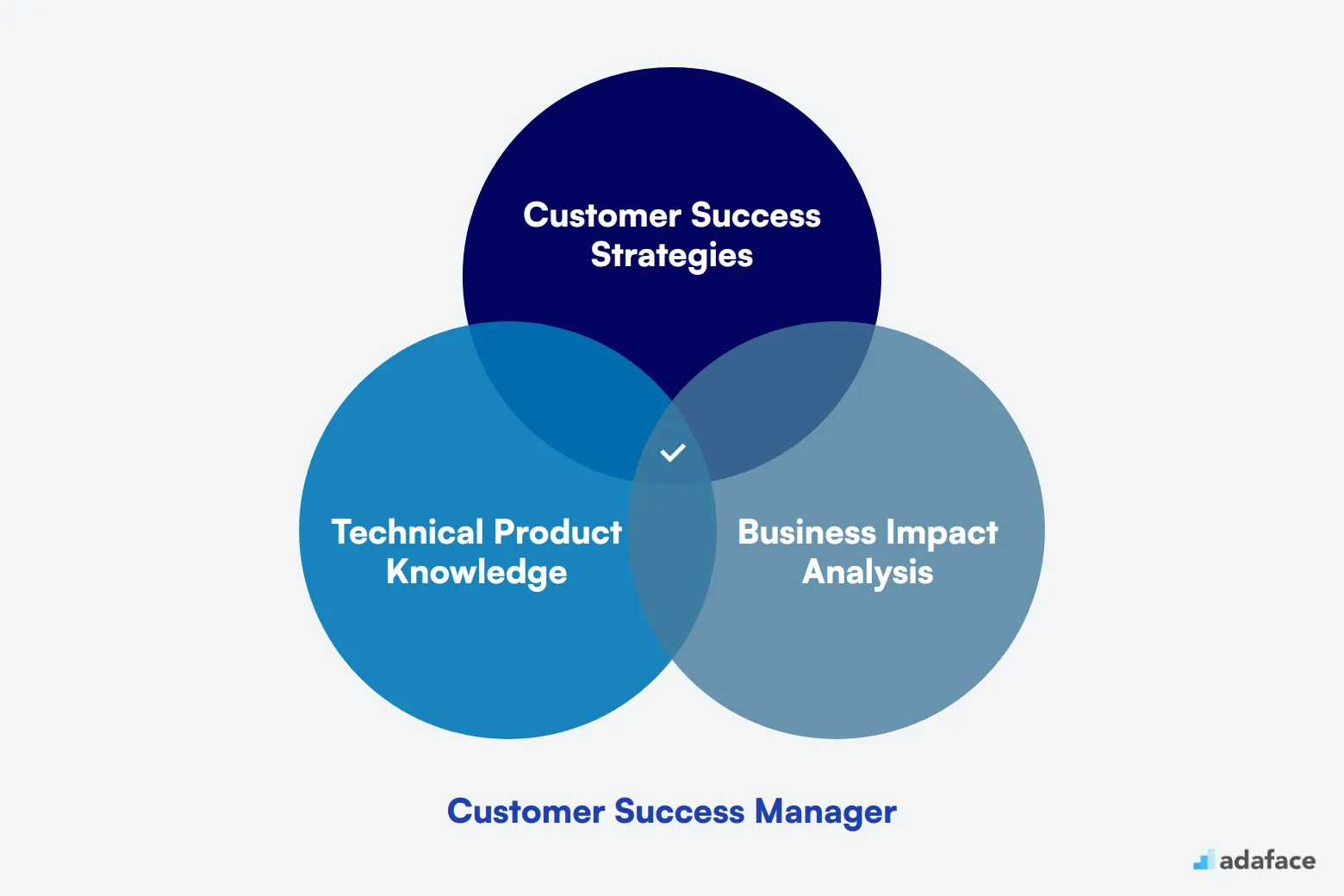
Customer Success Manager Hiring Process
The hiring process for a Customer Success Manager typically takes 4-6 weeks. Here's a quick overview of the timeline:
- Post a well-crafted job description on relevant platforms
- Review resumes (3-5 days)
- Conduct skill assessments or case studies (1 week)
- Interview shortlisted candidates (1-2 weeks)
- Make an offer to the best candidate
Each step is crucial in finding the right fit for your team. Let's dive deeper into these stages, exploring best practices and helpful resources for each phase of the Customer Success Manager hiring process.
Key Skills and Qualifications for a Customer Success Manager
Hiring the right Customer Success Manager can be challenging due to the wide range of skills and qualifications required for the role. Understanding what is a must-have versus a nice-to-have can make all the difference. For example, while familiarity with CRM software is critical, experience in the SaaS industry might be more relevant for certain companies than others.
To help you in defining the ideal candidate profile, here are popular required and preferred skills and qualifications for the Customer Success Manager role:
| Required skills and qualifications | Preferred skills and qualifications |
|---|---|
| Bachelor's degree in Business, Marketing, or related field | Experience in SaaS or technology industry |
| 3+ years of experience in customer success, account management, or similar role | Project management certification (e.g., PMP, PRINCE2) |
| Strong communication and interpersonal skills | Knowledge of customer success metrics and KPIs |
| Proficiency in CRM software (e.g., Salesforce, HubSpot) | Familiarity with data analysis and reporting tools |
| Demonstrated ability to manage multiple client relationships | Experience with customer onboarding and training |
How to Write an Effective Customer Success Manager Job Description
Once you've defined the ideal candidate profile, it's time to craft a compelling job description to attract top talent. Here are some key tips for writing an effective Customer Success Manager job description:
- Highlight key responsibilities: Clearly outline the CSM's role in driving customer satisfaction, retention, and growth. Mention specific tasks like onboarding, relationship management, and upselling.
- Balance technical and soft skills: While emphasizing product knowledge and data analysis abilities, don't forget to stress the importance of communication, empathy, and problem-solving skills.
- Showcase company culture: Highlight your organization's unique selling points, such as growth opportunities, innovative products, or a supportive team environment. This helps attract candidates who align with your values.
- Be specific about qualifications: Clearly state required experience levels, relevant certifications, and any industry-specific knowledge that's needed for success in the role.
10 Platforms to Hire Customer Success Managers
Now that you've crafted a detailed job description for a Customer Success Manager, the next step is to list it on various job platforms to attract suitable candidates. This process involves selecting the right channels to reach talent aligned with your company's needs and culture.
LinkedIn is a leading platform for hiring full-time professionals with a vast network of job seekers and industry insights.

AngelList
Ideal for hiring in the startup ecosystem, AngelList connects you with candidates interested in innovative startup environments.
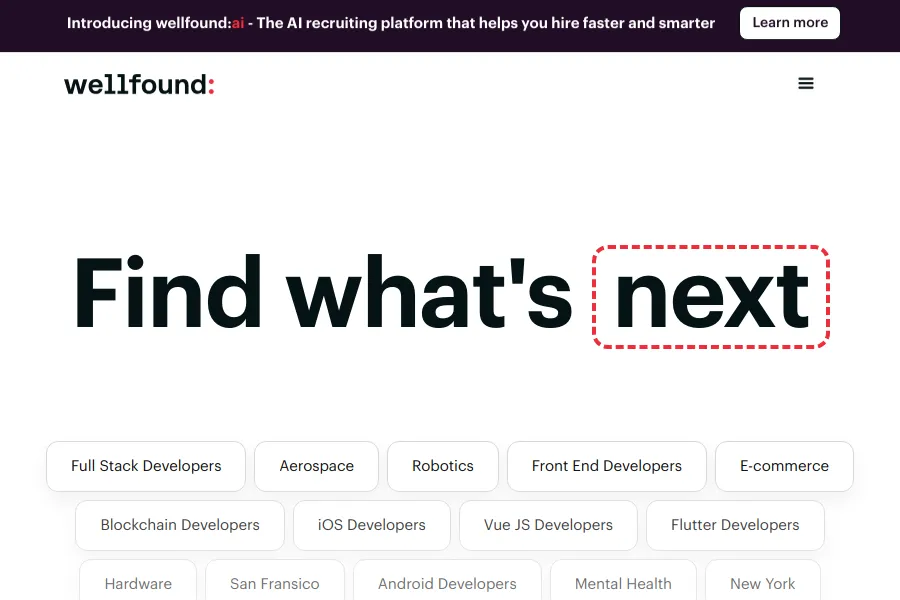
FlexJobs
FlexJobs specializes in remote and flexible job opportunities, perfect for finding Customer Success Managers open to remote work.

For remote and flexible roles, FlexJobs and Remote.co offer great visibility among candidates seeking such opportunities. Upwork and Toptal are exceptional for freelance positions if you require contract-based support. In addition, Built In is ideal for tech companies, while Glassdoor provides both job listings and insightful company reviews to draw in candidates. Lastly, Remote OK is perfect for a global audience interested in remote work. To ensure you find the best fit, consider using appropriate skills assessment tools during your hiring process.
How to Screen Customer Success Manager Resumes
Resume screening is a necessary step in hiring, especially for positions like a Customer Success Manager, where the fit between the candidate’s skills and the role is key. Screening helps identify potential hires who possess the needed skills and qualifications, saving time in the recruitment process.
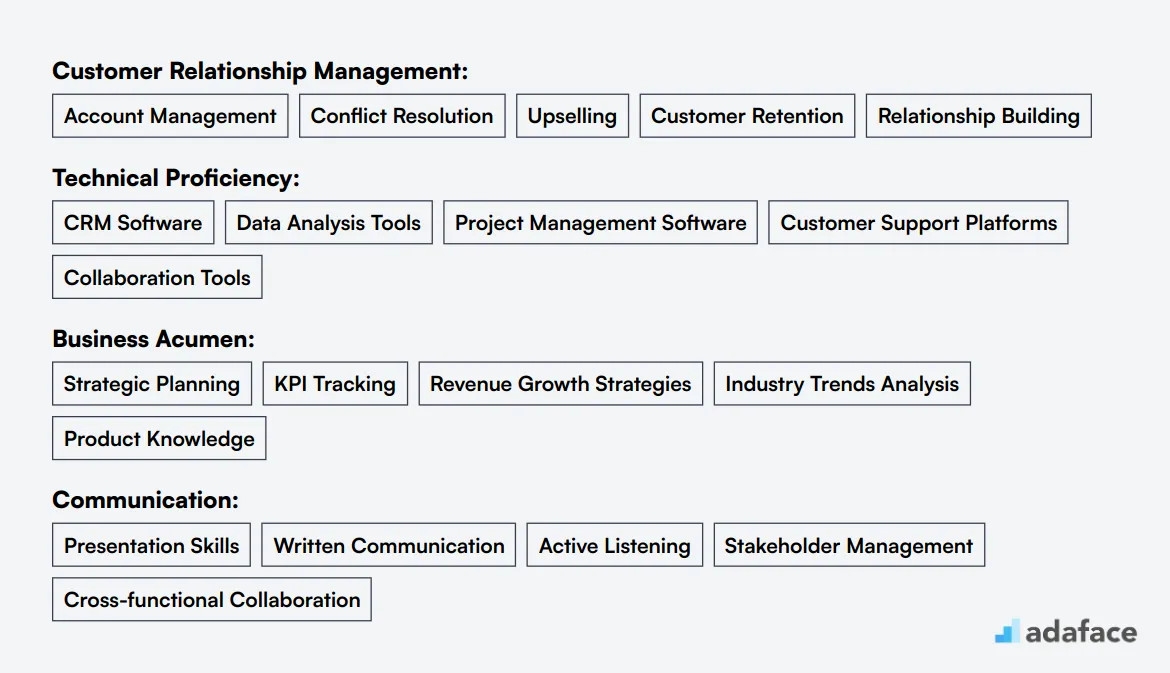
To manually screen resumes, focus on specific keywords that match the job requirements. Look for indications of a candidate's experience in customer success, account management, and their proficiency with CRM software like Salesforce or HubSpot. Other relevant skills include strong communication abilities and the capability to manage multiple client relationships.
Utilizing AI language models like ChatGPT can streamline resume screening by automating keyword detection. Provide the AI with a detailed prompt outlining the keywords and qualifications you're searching for, and it can efficiently highlight the strongest candidates, reducing manual workload.
Here’s a sample AI prompt you could use:
TASK: Screen resumes to match job description for Customer Success Manager role
INPUT: Resumes
OUTPUT: For each resume, provide following information:
- Email id
- Name
- Matching keywords
- Score (out of 10 based on keywords matched)
- Recommendation (detailed recommendation of whether to shortlist this candidate or not)
- Shortlist (Yes, No or Maybe)
RULES:
- If you are unsure about a candidate's fit, put the candidate as Maybe instead of No
- Keep recommendation crisp and to the point.
KEYWORDS DATA:
- Customer Success Strategies
- CRM Software (Salesforce, HubSpot)
- Communication (Presentation Skills, Active Listening)
- Account Management
- SaaS Experience
Recommended Skills Tests for Customer Success Managers
Skills tests are a great way to evaluate Customer Success Manager candidates beyond their resumes. They help you assess practical abilities and job-readiness. Here are five key tests we recommend for screening Customer Success Manager applicants:
Customer Success Manager Test: This tailored assessment evaluates candidates on core CSM competencies like account management, customer retention strategies, and upselling techniques.
Communication Test: Strong communication is critical for CSMs. A communication skills test helps gauge a candidate's ability to articulate ideas clearly and handle customer interactions effectively.
Problem-Solving Test: CSMs often need to troubleshoot issues and find creative solutions. A problem-solving assessment can reveal a candidate's analytical thinking and decision-making skills.
Time Management Test: Managing multiple accounts and priorities is key for CSMs. A time management test assesses a candidate's ability to organize tasks and meet deadlines efficiently.
Leadership Psychometric Test: As CSMs often lead customer-facing initiatives, a leadership assessment can help identify candidates with strong leadership potential and team management skills.
How much does it cost to hire a Customer Success Manager?
The cost of hiring a Customer Success Manager (CSM) varies widely based on location, experience, and company size. In the United States, CSM salaries typically range from $50,000 to $137,000, with a median of about $83,000. Top-tier cities like New York and Austin can command even higher salaries, reaching up to $160,000.
When budgeting for a CSM, consider factors beyond just salary. These may include benefits, bonuses, and potential relocation costs. Remember, investing in a skilled CSM can lead to improved customer retention and increased revenue, potentially offsetting the initial hiring costs.
Customer Success Manager Salary in the United States
The average salary for Customer Success Managers in the United States ranges from $50,132 to $137,712, with a median of $83,089. Top-paying cities include New York, NY, and Austin, TX, where CSMs can earn up to $160,527 and $152,240 respectively.
Salaries vary based on location, experience, and company size. For example, in Chicago, IL, the average salary is $90,784, while in Houston, TX, it's $80,009. Keep in mind that these figures can fluctuate with market demands and individual qualifications.
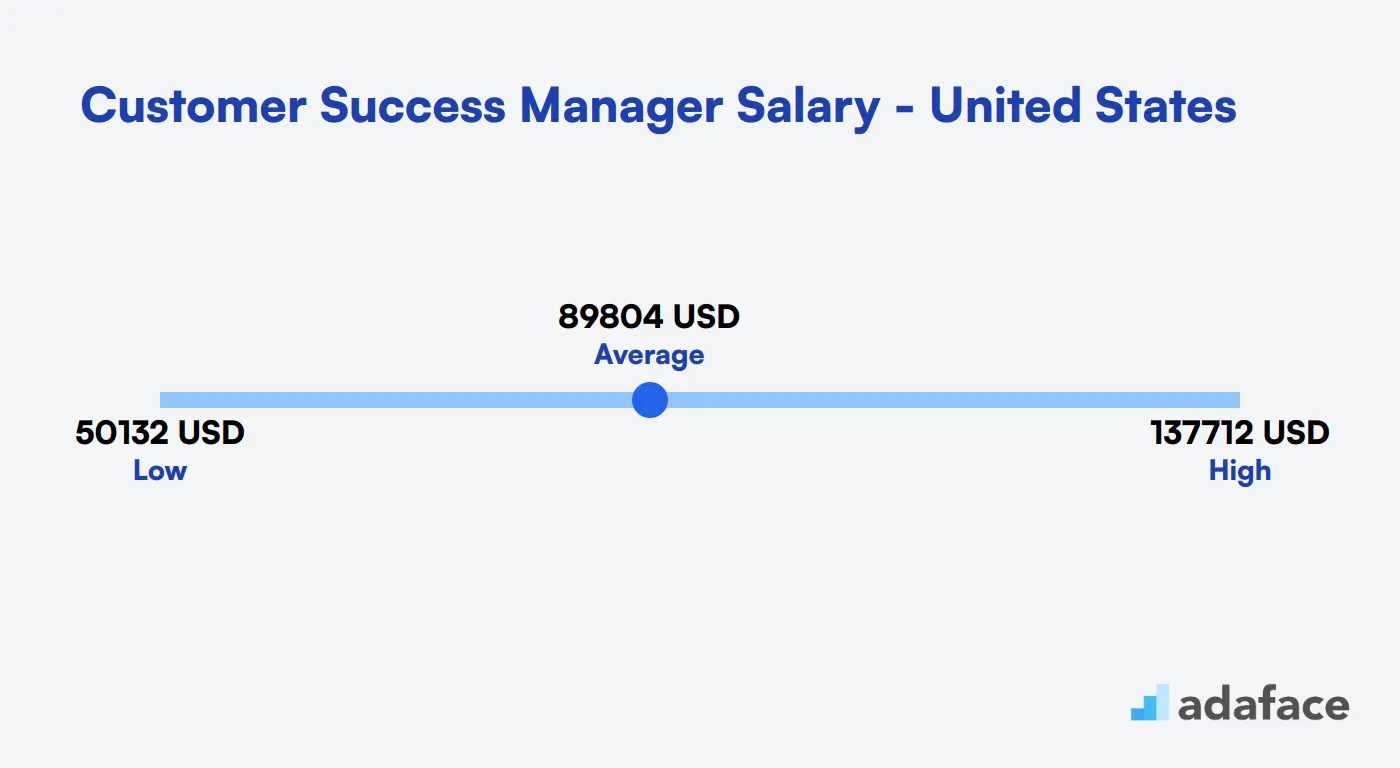
Customer Success Manager Salary in the United Kingdom
In the United Kingdom, Customer Success Manager salaries vary based on experience, company size, and location. The average salary ranges from £30,000 to £60,000 per year. London-based roles typically offer higher compensation, with some senior positions reaching up to £80,000 annually.
Factors influencing salary include industry expertise, technical skills, and proven track record in customer retention. Many companies also offer performance-based bonuses and benefits packages, which can significantly boost overall compensation.
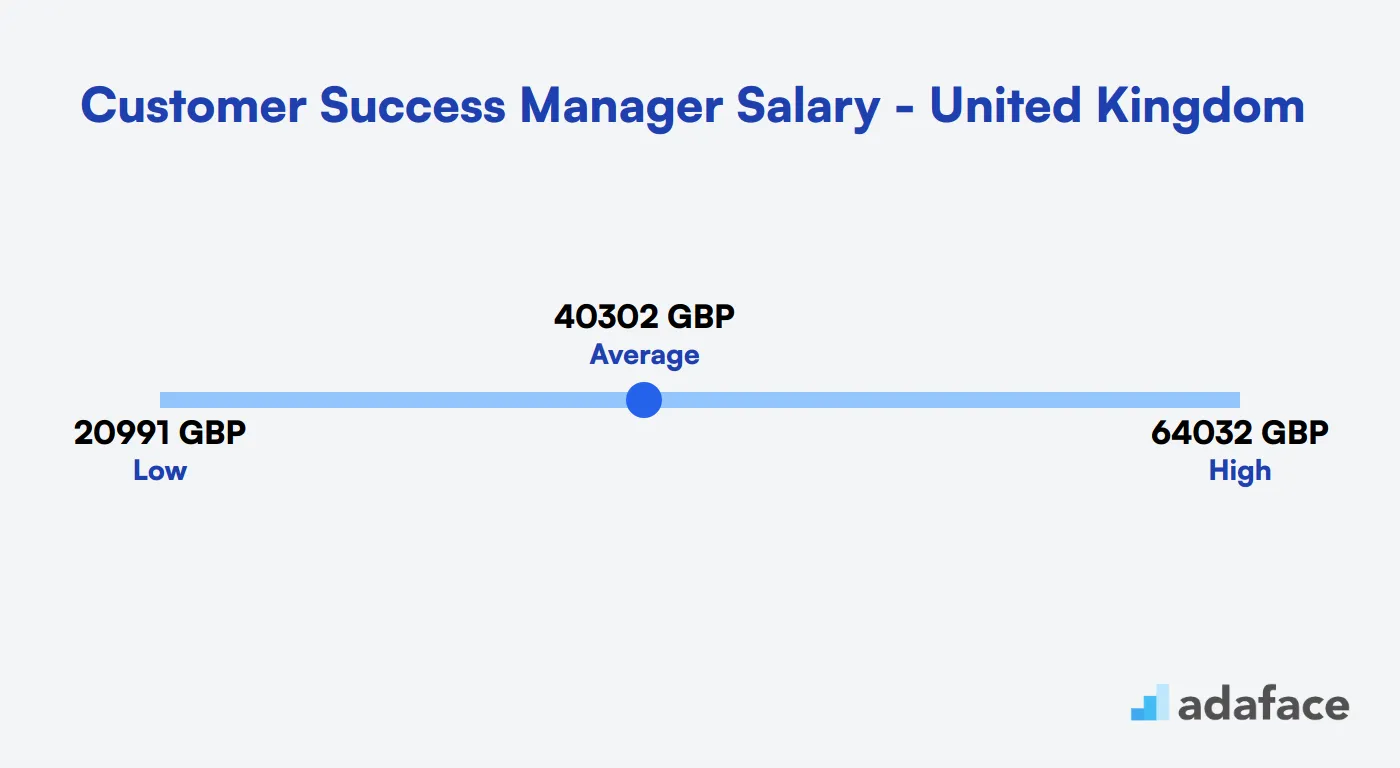
Customer Success Manager Salary in the Philippines
In the Philippines, Customer Success Manager salaries vary across different cities. Based on our data, the average salary ranges from ₱392,500 to ₱674,258 per year. Manila offers the highest median salary at ₱610,200, while Iloilo City has the lowest at ₱279,949.
Factors influencing these salaries include location, company size, and individual experience. Cities like Manila, Clark Freeport Zone, and Taguig typically offer higher compensation due to their status as business hubs.
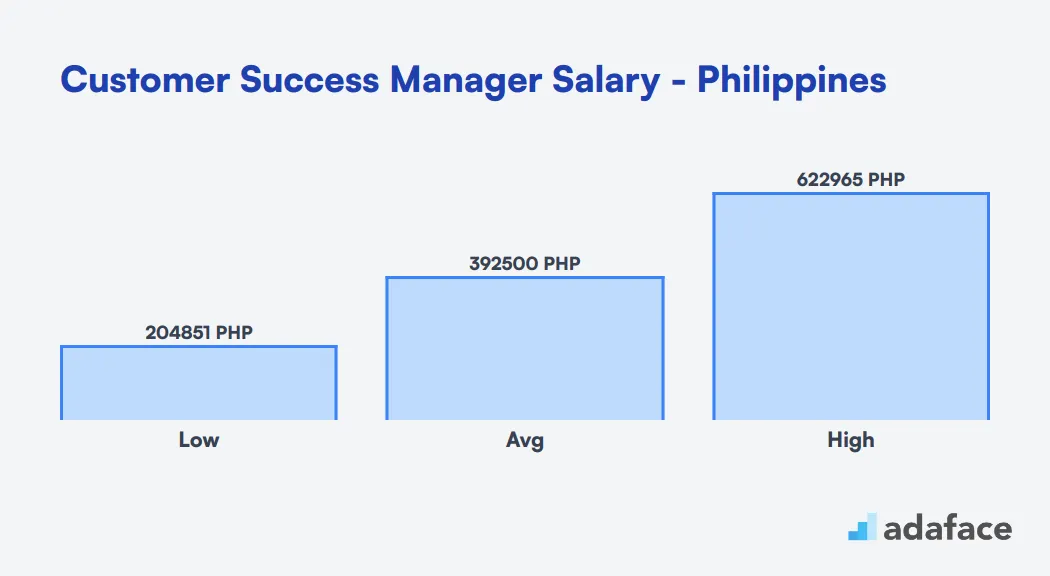
Customer Success Manager salary in Canada
In Canada, the average salary for a Customer Success Manager is around $74,902 CAD. Depending on the city, salaries can range widely. For example, in Kitchener, ON, wages range from $60,275 CAD to $121,854 CAD, with a median of $85,701 CAD. Meanwhile, in Halifax, NS, the range is lower, from $31,562 CAD to $74,597 CAD, with a median of $48,523 CAD. This variance highlights how location impacts compensation.
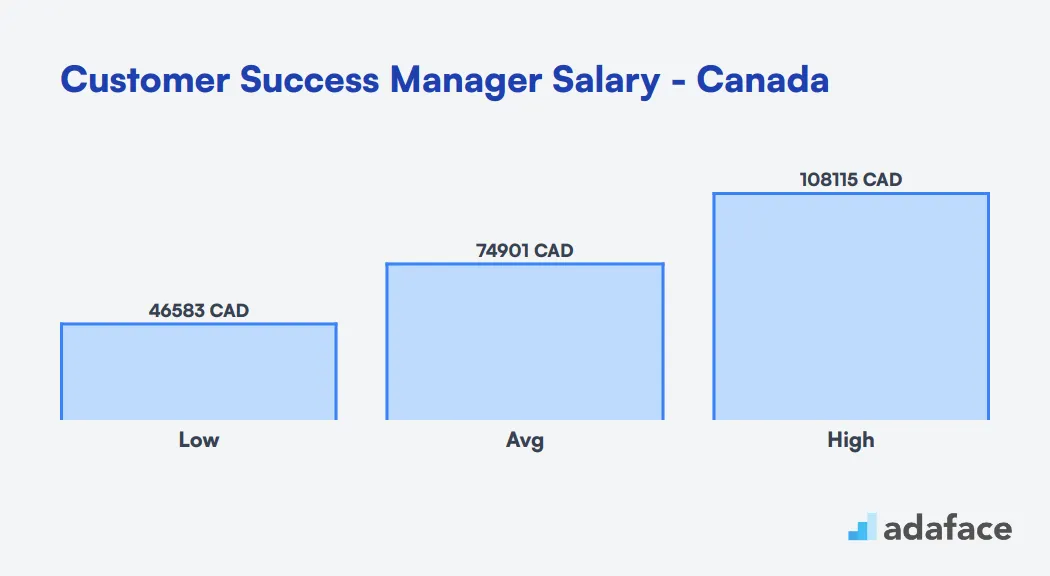
What's the difference between a Customer Success Manager and an Account Manager?
Customer Success Managers (CSMs) and Account Managers (AMs) are often confused due to their overlapping responsibilities in managing client relationships. However, their roles differ significantly in focus, timing, and key objectives.
CSMs primarily concentrate on customer satisfaction and retention. They handle post-sale activities like onboarding, product adoption, and issue resolution. Their success is measured by customer health, product usage, and churn rates.
AMs, on the other hand, focus on sales and revenue growth. They're involved in pre-sale and ongoing activities such as contract negotiations, upselling, and relationship management. Their performance is evaluated based on revenue, contract renewals, and account growth.
The technical knowledge and background of these roles also differ. CSMs typically have in-depth product expertise and often come from customer service or technical support backgrounds. AMs usually have a general product understanding and sales or business development experience.
In terms of communication and collaboration, CSMs tend to be proactive and educational, working closely with product, support, and engineering teams. AMs are more persuasive and relationship-focused, collaborating mainly with sales, marketing, and finance teams.
Understanding these differences is crucial for recruiters and hiring managers to find the right fit for each role. Both positions are valuable, but they serve distinct purposes in an organization's customer-facing strategy.
| Customer Success Manager | Account Manager | |
|---|---|---|
| Primary Focus | Customer satisfaction and retention | Sales and revenue growth |
| Key Responsibilities | Onboarding, product adoption, issue resolution | Contract negotiations, upselling, relationship management |
| Interaction Timing | Post-sale | Pre-sale and ongoing |
| Success Metrics | Customer health, product usage, churn rate | Revenue, contract renewals, account growth |
| Technical Knowledge | In-depth product expertise | General product understanding |
| Typical Background | Customer service, technical support | Sales, business development |
| Communication Style | Proactive, educational | Persuasive, relationship-building |
| Team Collaboration | Product, support, engineering | Sales, marketing, finance |
What are the ranks of Customer Success Managers?
Understanding the hierarchy in the field of Customer Success can be tricky, as the roles often overlap with other positions in customer-facing domains. Knowing these ranks helps in identifying the right talent for the specific needs of your organization.
- Customer Success Associate: This is usually an entry-level position where the associate supports the Customer Success Manager by handling communication with clients and ensuring their queries are addressed promptly. They often handle administrative tasks and assist in the overall management of client relationships.
- Customer Success Manager: At the heart of the team, a Customer Success Manager is responsible for overseeing the customer's journey, ensuring satisfaction, and fostering long-term relationships. They work closely with other departments to align customer needs with company offerings. For a detailed understanding of this role, you can refer to our Customer Success Manager job description.
- Senior Customer Success Manager: This role involves leading a team of Customer Success Managers and strategizing on customer retention and expansion. They are integral in developing frameworks for customer engagement and ensuring that the customer success team meets its goals.
- Director of Customer Success: At this level, the responsibility shifts towards devising company-wide customer success strategies. The Director manages the entire customer success department, focusing on enhancing the customer experience and driving the business's growth through customer loyalty.
Hire the Best Customer Success Managers
Throughout this blog post, we've discussed the importance of hiring a Customer Success Manager, the hiring process, and the key skills and qualifications required for this role. We've also covered how to write an effective job description and the best platforms to find talented candidates. Armed with this knowledge, you should be ready to identify and attract top-tier professionals.
If there's one key takeaway, it's to use accurate job descriptions and skills assessments for a precise hiring process. Utilizing tools like the Customer Success Manager Test can help ensure you find the right candidate who aligns with your company’s needs. Remember, investing in the right assessments can make all the difference in building a strong team.
Customer Success Manager Test
FAQs
Key skills for a Customer Success Manager include excellent communication, problem-solving abilities, empathy, strategic thinking, and a deep understanding of customer needs. They should also be proficient in data analysis, project management, and have strong interpersonal skills.
When screening resumes, look for candidates with a track record of improving customer retention rates, experience with CRM software, and a history of successful project management. Pay attention to their ability to communicate complex ideas simply and any relevant industry experience.
Some effective questions include: 'How do you approach building relationships with clients?', 'Can you describe a situation where you turned a dissatisfied customer into a loyal one?', and 'How do you measure the success of your customer success initiatives?' For more ideas, check our Customer Success Manager interview questions.
Utilize skills assessment tools like Customer Success Manager tests, case studies, and role-playing exercises. These can help evaluate a candidate's problem-solving abilities, communication skills, and customer-centric approach in real-world scenarios.
A typical career path might start at Customer Success Associate, progressing to Customer Success Manager, Senior Customer Success Manager, and potentially to Director or VP of Customer Success. Some may also transition into related roles in sales, account management, or operations.
The hiring process for a Customer Success Manager can take anywhere from 4 to 8 weeks, depending on factors such as the company's hiring procedures, the number of qualified candidates, and the urgency of the role. Using efficient screening methods like pre-employment assessments can help streamline this process.

40 min skill tests.
No trick questions.
Accurate shortlisting.
We make it easy for you to find the best candidates in your pipeline with a 40 min skills test.
Try for freeRelated posts
Free resources



